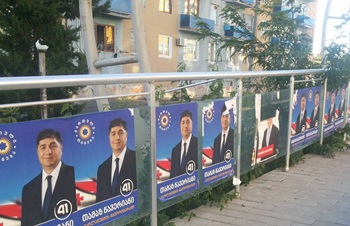Gulnur Kazimova
“Several days are left before the elections and we still do not know how many single mandate candidates participate in the ballot in our district. We met only one ethnic Azerbaijani female candidate and one Georgian candidate, who met people in the school. To tell the truth, I do not expect that any of them will do any good for us,” Vahid Humbethov from Nakhiduri village, Bolnisi municipality said.
Like Vahid Humbethov, neither other ethnic Azerbaijani people living in Bolnisi and Marneuli municipalities have information about the October 8 Parliamentary Elections and participating political parties.
According to the 2014 census, Azerbaijani people make 6.3% of the Georgian population. According to the Central Election Commission [CEC], there are 344 polling stations in the regions compactly inhabited by ethnic minorities; 207 of them are Georgian-Azerbaijani settlements.
Jamila Abbasli from Nakhiduri village said he has never participated in any elections and is not going to the elections neither this time. “Elections do not change anything for us. They will elect those, who are acceptable for the government. The already elected people care only about themselves and not about people. Nobody from political parties recalled about us during this election. They did not bring any election brochure to us. Even if we go to the elections, we do not know who is the single mandate candidate in our district.”
The only place in Nakhiduri village, where you can feel upcoming elections, is the village center. Mostly elderly men gather there and talk about elections.
“Elections? Apparently they donot care that we also were informed about elections. I am an old man. For years, I see that the government does not care about the education of ethnic minorities. Nobody comes to us before elections to explain and inform us about elections. 10 days before the elections they started to repair the road to gain our support – do they want to gain our votes in similar way? Nobody comes and inquires what is our real need,” 79-year-old Rashid Aliyev said.
Representatives of the CEC state the main obstacle for ethnic minorities to participate in the elections is low education and illiteracy of the Georgian language.
“Although after 2008, election documents are translated into the languages of minorities, experience showed that only translated documemts cannot guarantee awareness raising and engagement of the minorities. A working group was created in 2012, whose task was to identify the problems of ethnic minorities and to elaborate the action plan,” the CEC representatives say.
The CEC administration added that after problems identification, series of different activities were implemented to educate the ethnic minorities and raise their awareness: ethnic Azerbaijani and Armenian people were employeed in the CEC information centers; their main task is to reach out as many people as possible about election issues; a new category – ethnic minorities was added to the CEC official webpage, where minorities can see documents and watch videos in their native languages.
Chairman of the International Center for Civil Culture Kote Kandelaki said active pre-election process is going on in the regions compactly inhabitted by ethnic minorities. “The main reason of low engagement of ethnic Azerbaijani people in the lections is lack of information. However, this year, there is more pluralistic environament than in 2012 parliamentary elections. That’s why the candidates of the United National Movement try to gain more supporters among ethnic minorities.”
Over 30 local and international observation organizations monitor October 8, 2016 parliamentary elections in Georgia. Project officer Nino Khitarishvili at the International Society for Fair Elections and Democracy said their organization has not observed any significant election violation in the regions inhabited with ethnic minorities yet. “Cases of misuse of administrative resources, voters bribery and interference in the election campaigns were observed during pre-election period. However, they were not significant enough to have any impact on free and fair election enviornment and on the election results in general. More significant violations may be observed on the Election Day in the regions.”
On October 8, over 800 single mandate candidates fight for the seats in the parliament in 73 single mandate districts. 136 of them are woman. According to the CEC, there are 3 537 719 registered voters in Georgia; 25 political parties and 8 blocks participate in the ballot.
The article was prepared in the frame of the project implemented by Human Rights House Tbilisi with financial support of the Embassy of the Kingdom of Netherlands in Georgia. HRHT bears sole responsibility for the content of the article. The article does not necessarily reflect the views of the donor.
News
December 13, 2023
Ethnic minorities outside the peace dialogue
November 6, 2023
‘Peace’ agenda of political parties
Popular
Articles
February 13, 2024




